Champions of Change Blog
Veteran Clean Energy Leaders – Continuing a Call to Serve
Posted by on November 5, 2013 at 12:11 PM EDT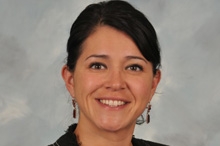
Elizabeth Perez-Halperin is being honored as a Veteran Advancing Clean Energy and Climate Security Champion of Change.
I am grateful to be a recipient of the Veterans Advancing Clean Energy and Climate Security Champions of Change honor – it is more than a personal recognition; it is an acknowledgement I share with my fellow veterans who are also committed to keeping America safe and strong.
Like so many of my peers, I was motivated not only to serve in uniform but also to serve our families, our communities, and our country in the rest of my life. For me, continuing my service meant finding ways to reduce the root causes of conflict – so that fewer wars will be necessary and our country can redirect its efforts to more peaceful pursuits.
This path led me to learn about energy security, sustainability, water conservation, and the challenges posed by climate change. Since my service ended I have examined the close relationship between energy independence and national security, and I have learned that the U.S.’s dependence on foreign energy sources poses a serious military threat, both economically and geopolitically. In addition, climate change presents a severe risk to the security and prosperity of the United States and the world.
Like many veterans, I was influenced by a legacy of my family’s military service – and their military hardships. I often think about this in the context of 1991 and the start of the First Gulf War. While at age twelve I had no awareness of the concept of climate change, I did understand the concept of limited resources and the reasons my father was going to war. My father enlisted in the Army for 17 years and served during the First Gulf War with the 101st Airborne Division. I lost my father shortly after his medical discharge from the Army – and then I joined the Navy in his honor.
I quickly realized enlistment meant saying goodbye to being a kid. Like many of my fellow Navy enlistees, I had to grow up overnight and no day underscored that point better than the day the U.S.S. Cole was attacked. I lost a friend, my “shipmate”, Seaman Palmer from San Diego, CA. Seaman Palmer and I were alike in many ways. We were both the same young age, with seemingly bright futures. But her life was taken away too soon and her memory stays with me to this day.
Not long after I found myself overseas directly supporting the 5th and 6th Fleets in the Second Gulf War. With many sleepless nights on watch, I thought a lot about the conflict we were once again engaged in, and I imagined the world I wanted my children to live in and how I could advance that more prosperous future in the years after I returned home.
Since transitioning from active duty, I have been on a journey of finding solutions to create a safer, stronger country. These goals connected me to my Native American traditions of protecting the earth and my experiences as a veteran protecting the U.S. in war. That is why I founded the renewable energy firm, GC Green, which works to broaden the outreach and impact of the green economy.
Even more valuably, GC Green has given me a platform to provide education, training, and outreach in renewable energy and water conservation. GC Green has allowed me to place more veterans in good jobs within the growing green economy. Since its founding in 2010, GC Green has served more than 1,300 individuals by providing training in the renewable energy industry, teaching entrepreneurship skills, and providing clean tech industry job placement assistance.
I look forward to using this award’s recognition to inspire even more veterans to use their skills and experience to confront the world’s challenges.
Elizabeth Perez-Halperin is a Navy veteran and the CEO and Founder of GC Green in San Diego, CA. GC Green is a renewable energy general contracting and consulting firm that provides veteran outreach, education, training, and job placement in the clean tech industry throughout California.
Learn more about Energy and EnvironmentCarrying the Flag Forward To a Clean Energy Future
Posted by on November 5, 2013 at 12:08 PM EDT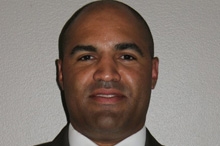
Kevin Johnson is being honored as a Veteran Advancing Clean Energy and Climate Security Champion of Change.
It is a tremendous honor to be recognized as a White House Champion of Change and I am humbled by the opportunity to share my experiences as an Iraq War Veteran now working to combat our nation’s dependence on fossil fuels and the impacts of climate change. Throughout my life, I have had the good fortune to be surrounded by positive influences that have helped me shape my values and choose my career path. Growing up in Scranton, PA, I learned the true meaning of hard work and sacrifice from my mother. I learned what community really means and the importance of friendship, trust, and integrity. Moreover, I learned how important it is to appreciate service and leadership in all forms.
I graduated from the United States Military Academy at West Point and served as an Army Captain in Bayji, Iraq. My tour in Iraq was served in the shadow of seemingly endless oil fires that filled the desert sky as insurgents attacked pipelines at a nearby refinery in an attempt to cripple the country’s economy. At the same time, our own military’s dependence on fossil fuels was placing thousands of my fellow soldiers in harm’s way. One in every 24 fuel convoys in Iraq and Afghanistan ended in an American casualty, with more than three thousand Americans killed in fuel-supply convoys between 2003 and 2007 alone.
My proudest professional accomplishment was safely returning all 130 of my soldiers home to their families upon redeployment from Bayji in 2005. My experience taught me that reducing our dependence on fossil fuels would make our nation more secure and bring more soldiers home safely. For these reasons, I decided to focus my MBA studies at Cornell University and my civilian career at Acciona Energy on the advancement of clean energy technologies.
Thankfully, many veterans – ranging from privates to general officers – are returning from a decade of war with a similar commitment to securing our nation’s energy future and combating the impacts of climate change. Operation Free, a national coalition of thousands of veterans, national security leaders, and military family members in all fifty states, is tackling climate change. Today, Operation Free is leading the fight for clean energy policies at both the federal and state levels.
The Department of Defense has recognized that the need to secure our nation’s energy future is a national security issue of the highest magnitude and will require bold and decisive action. Deploying clean energy technology can help create a better future and a stronger nation, but it will not be easy. This is precisely the kind of challenge our veterans are trained for.
As the President noted in his 2009 inaugural address, “[…] it has been the risk-takers, the doers, the makers of things – some celebrated, but more often men and women obscure in their labor – who have carried us up the long rugged path towards prosperity and freedom. Let it be said by our children's children that when we were tested we refused to let this journey end, that we did not turn back nor did we falter.”
Our nation’s veterans, from Scranton to Seattle, have been battle tested. We will carry the flag forward on this long, rugged path to a clean energy future. We will not turn back and we will not falter.
Kevin Johnson is the Senior Manager of Mergers & Acquisitions and Federal Business Development for Acciona Energy North America, a global leader in renewable energy.
Learn more about Energy and EnvironmentDrive Less, Live More
Posted by on November 5, 2013 at 10:29 AM EDT
Joseph Kopser is being honored as a Veteran Advancing Clean Energy and Climate Security Champion of Change.
Henry Ford had a pretty great idea when he introduced the first Model T in 1908: make the automobile business more efficient and personal transportation accessible to everyone. He revolutionized travel, but for the last century things have remained largely the same.
I think it’s time for another change – we need to re-think transportation efficiency and Defense Energy.
I first became aware of our country’s Defense Energy Security policy in 2004 while serving with the Army in Iraq and helping with Iraqi national elections. The base had hundreds of Containerized Housing Units all powered by enormous generators. Speaking with local Iraqis, I was shocked to learn just how much fuel these housing units were wasting.
There we were – Americans serving to protect American interests in the Middle East, but using precious energy in a very inefficient manner. Since that realization I have dedicated my efforts to solving this pervasive problem. My goal is to lighten the load for the war-fighter. While never sacrificing mission effectiveness, I want to reduce energy demand with lighter, more efficient systems.
One of the most important things we can do to reduce our dependency on foreign oil is to simply use less of it. In the United States our daily commute is an incredibly inefficient use of resources – including oil, money, and time. We waste billions of gallons of fuel and hours of time just sitting in idle traffic. We can do better.
I created RideScout to present people with all their options to get from Point A to Point B. Inside the app are options for public, commercial, and private transportation – including Car2Go and SideCar – that allow the user to plan his/her transport depending on specific needs. When people see they can reach their destination in nearly the same amount of time without driving alone or fighting for parking, it changes their entire mindset.
RideScout is a tool that can help Americans reduce personal car use without sacrificing their sense of independence. Unlike Henry Ford, I don’t believe that freedom is tied to car ownership, but rather the ability to get to your destination with reliability and flexibility at an affordable price.
When we decrease the number of cars on the road, reduce our foreign oil use, and spend more time doing things we love rather than sitting in traffic, everyone wins.
As a country we need to focus our resources on a comprehensive solution to fixing our Defense Energy Security problem. Starting in central Texas, I believe we can assemble the right collection of industry, university, government, non-governmental organizations, and military leaders to tackle our biggest problems.
Joseph Kopser is the co-Founder and CEO of RideScout, a mobile app that shows all transportation options in one view.
Learn more about Energy and EnvironmentCarbon, Conservation, and Community – Protecting Military Readiness and Natural Resources While Promoting Economic Development in Rural Communities
Posted by on November 5, 2013 at 10:18 AM EDT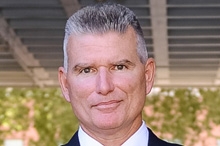
Joe Knott is being honored as a Veteran Advancing Clean Energy and Climate Security Champion of Change.
I grew up in Cincinnati, OH, as the oldest of five children. At seventeen I made the choice to serve my country, joining the Ohio National Guard and shipping off to basic training after graduating from high school early. During my 33 years in uniform I came to realize the full meaning of service to one’s country and learned to always be thankful and “give back” for the privilege of living in the greatest country in the world. Early in my military career I volunteered for multiple deployments to Central America, living in the mountains of Honduras while building roads and schools for those less fortunate. After returning to the U.S., I became an officer and full-time soldier, and for the next three decades had the privilege to work with uniformed and civilian professionals at all levels within the Army’s environmental and sustainability organizations.
Serving as the National Guard Bureau’s Sustainability and Energy program manager, I was responsible for sustainability education and renewable energy initiatives for all 54 States and Territories. As a senior officer, I led efforts to decrease the Army’s fossil fuel use and greatly increase renewable energy use, including the Army National Guard’s first Solar Power Purchase Agreement. While stationed at the Pentagon, I served as the program manager for the Army Compatible Use Buffer program, the Army’s premier land conservation and partnership program. Under my leadership the program conserved more than 70,000 acres of U.S. land for permanent protection of habitat and green space. After over three decades of military service, it is especially rewarding, both personally and professionally, to receive recognition from my Commander in Chief as a Champion of Change.
Shortly after my retirement from service, I joined the Compatible Lands Foundation, a non-profit land trust specializing in innovative conservation partnerships with the Department of Defense. I am currently leading a first-of-its-kind partnership between federal agencies, non-governmental organizations, academia, green investors, and industry to create the Readiness and Environmental Protection Integration program’s first forest carbon project. We are working with federal partners from the Army and National Guard Bureau along with USDA’s Natural Resources Conservation Service and the US Forest Service. Other partners include Mississippi State University and Northern Arizona University as well as the National Wild Turkey Federation.
We all realize that so much more can be accomplished together rather than individually; what matters is education, passion, and collaboration. Through this unique partnership we are developing a carbon sequestration project to protect national security, preserve natural resources and endangered species, and support local economies and rural jobs – all while sequestering more than 68,000 tons of greenhouse gases. Revenues from carbon offset sales will help finance additional climate resilience and cooperative conservation initiatives in Mississippi for the next ninety-nine years. This carbon sequestration project will also provide a template for replicating climate change mitigation initiatives across the United States, creating opportunities to sequester hundreds of thousands of tons of additional carbon each year.
During my “retirement” I am pursuing my Ph.D. at Arizona State University’s Global Institute of Sustainability with the goal of becoming a college professor. I seek to educate the next generation about climate change, the importance of renewable energy to national security, and the importance of preserving what we are all blessed to have received.
Lieutenant Colonel Joe Knott (Ret.) is the Director of Military Partnerships for the Compatible Lands Foundation, a non-profit organization specializing in innovative conservation partnerships with the Department of Defense.
Learn more about Energy and EnvironmentSaving our Future by Changing the Way We Think About Energy
Posted by on November 5, 2013 at 10:16 AM EDT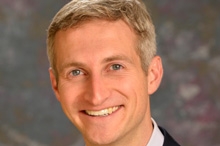
Drew Sloan is being honored as a Veteran Advancing Clean Energy and Climate Security Champion of Change.
It is a true and humbling honor to be named a Veteran Advancing Clean Energy & Climate Security Champion of Change, because the way the world engages with its energy sources in the years to come will define the life of each and every one of this planet’s inhabitants.
My experiences as an Army officer offered a clear view of the interconnections between energy – be it possession, pursuit, or production – and conflict. That view was not shaped by my time in Iraq, where some have argued American involvement was based largely on attempting to secure and safeguard energy resources. Instead, my views were shaped by the physical darkness in Afghanistan – the kind of pitch-black darkness found only in a night sky with no TVs or blinking alarm clocks to distract. In Afghanistan I lived in a region with no lights to let students study at night and no reliable power to keep shops open past sunset. It was a land locked in conflict, without energy, but filled with people deeply desiring a better life.
There is no doubt that energy access makes our lives better. It allows businesses to stay open past dark and children to study after dinner. Energy powers the modern world and modern life. People aspire to the opportunities energy provides, and rightly so – it is perhaps the greatest of all enablers and everyone deserves access.
As such, our challenge is not to restrict access to energy, but to enable it in a responsible manner. In the developing world this means focusing on sourcing energy in the cleanest ways possible, because the pursuit and production of energy is not without costs. CO2 emissions from the burning of fossil fuels have already caused extensive damage to the world’s ecosystems. This damage is the direct result of 75 percent of the world’s population obtaining energy from fossil fuels. These negative effects on our climate will only escalate if the remaining 25 percent currently living without seek access to energy in the same way. This challenge to empower the developing world to source its burgeoning energy needs through clean sources is crucially important.
Although the developing world is important, developed nations must lead the way. It is no secret that those of us in the developed world use a lot of energy – and we also waste much of that energy. This lifestyle must change. To enable that change, my software company Opower works with utilities to give customers better insight into their energy usage – insight that leads to smarter, more productive energy decisions without sacrificing quality of life. Currently communicated to more than eighteen million homes worldwide, Opower’s efforts encouraging people to make better, more efficient energy choices has saved over three terawatt hours (TWh) of energy – roughly the equivalent of the combined power needs of both Salt Lake City and St. Louis for a year – all through the empowerment of the collective to make wiser energy choices.
The parts we all play in managing our energy use in the years to come will determine the future we will share together. It is a simple truth, but a powerful challenge.
Drew Sloan is a former U.S. Army officer and currently works as a Sales Executive for the energy efficiency software company Opower and is also a Fellow with the Truman National Security Project.
Learn more about Energy and EnvironmentEnergy Independence, Military Readiness, and Economic Growth: Clean Energy Leads to National Security
Posted by on November 5, 2013 at 10:14 AM EDT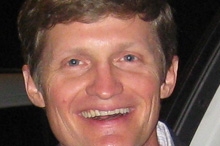
Dave Belote is being honored as a Veteran Advancing Clean Energy and Climate Security Champion of Change.
I’ve been blessed with two exciting and fulfilling careers: first as a fighter pilot, Battlefield Airman, and base commander; and now as a clean energy developer and advocate. While the two may seem unrelated, each has served the same goal – to ensure a long and prosperous future for the country I love. My lifelong commitment to national security has taught me that keeping our country safe will require more than military readiness. I’m convinced that energy independence and economic growth are equally important to our nation’s long-term prosperity. Renewable energy is at the nexus of the three.
When I moved to Nevada in 2008 to become the installation commander for Nellis Air Force Base, Creech Air Force Base, and the Nevada Test and Training Range, I knew almost nothing about clean energy development. After taking command, I learned quickly. I inherited the then-largest solar photovoltaic array on the continent, a 14-megawatt system that produced more than 25 percent of Nellis’s electricity and saved roughly $83,000 per month in energy costs during my tenure. I was also asked to help site a 110-megawatt solar tower near Tonopah, NV – not an easy task, as we had to protect sophisticated test range capabilities in the vicinity. With the help of Massachusetts Institute of Technology’s Lincoln Laboratory and its cutting-edge analysis, we found a win-win site for both the military and the solar company, allowing the project to move forward.
The Tonopah project was not unique in its siting challenges. Siting projects near Department of Defense (DoD) facilities requires consideration of impacts on radar systems, training procedures, and test facilities. Our Nevada solution became a model and led me back to the Pentagon as a civilian, where I created the DoD Siting Clearinghouse to review energy projects nationwide and promote mission-compatible development on and around military facilities. From industry we learned how renewable energy can drive a local economy by creating construction jobs, providing income for rural landowners, and increasing county tax revenues. Working with scientists and engineers, we determined how close to various military facilities we could place turbines and solar systems. We actively engaged developers and found innovative, cooperative solutions. To date the Clearinghouse has approved more than 96 percent of the requests it has received, honoring landowner rights and entrepreneurial drive while protecting the DoD’s mission.
My path has taken me to the private sector, where I am developing the types of projects I would have appreciated as a base commander – total energy surety solutions combining on-site generation, storage, and smart grid software. Apex Clean Energy has empowered me to design wind and solar energy projects specifically for military customers. At the same time, I am able to tackle larger issues by working with advocacy groups like the American Council on Renewable Energy, the Association of Defense Communities, Environmental Entrepreneurs, and the Truman Project on National Security.
The future of clean energy in our country is bright, but there is much more we can do. We need to amend the current tax structure to level the financial playing field, and I believe a refundable tax credit will bring us one step closer to cheaper capital through Master Limited Partnerships. I applaud the President’s goal of 10 gigawatts of renewable energy on public lands, but I believe we need a comprehensive review of military missions on federal lands and the outer continental shelf in order to achieve it. I firmly believe we can find the proper balance of military readiness and energy independence, and that the renewable energy facilities we build will provide jobs and revenues to support local services, creating true national security for our country.
Dave Belote, Vice President for Federal Business at Apex Clean Energy, works to create mission-compatible renewable energy solutions for military installations, public lands, and the outer continental shelf.
Learn more about Energy and Environment
- &lsaquo previous
- …
- 35
- 36
- 37
- 38
- 39
- 40
- 41
- 42
- 43
- …
- next &rsaquo
White House Blogs
- The White House Blog
- Middle Class Task Force
- Council of Economic Advisers
- Council on Environmental Quality
- Council on Women and Girls
- Office of Intergovernmental Affairs
- Office of Management and Budget
- Office of Public Engagement
- Office of Science & Tech Policy
- Office of Urban Affairs
- Open Government
- Faith and Neighborhood Partnerships
- Social Innovation and Civic Participation
- US Trade Representative
- Office National Drug Control Policy
categories
- AIDS Policy
- Alaska
- Blueprint for an America Built to Last
- Budget
- Civil Rights
- Defense
- Disabilities
- Economy
- Education
- Energy and Environment
- Equal Pay
- Ethics
- Faith Based
- Fiscal Responsibility
- Foreign Policy
- Grab Bag
- Health Care
- Homeland Security
- Immigration
- Innovation Fellows
- Inside the White House
- Middle Class Security
- Open Government
- Poverty
- Rural
- Seniors and Social Security
- Service
- Social Innovation
- State of the Union
- Taxes
- Technology
- Urban Policy
- Veterans
- Violence Prevention
- White House Internships
- Women
- Working Families
- Additional Issues

